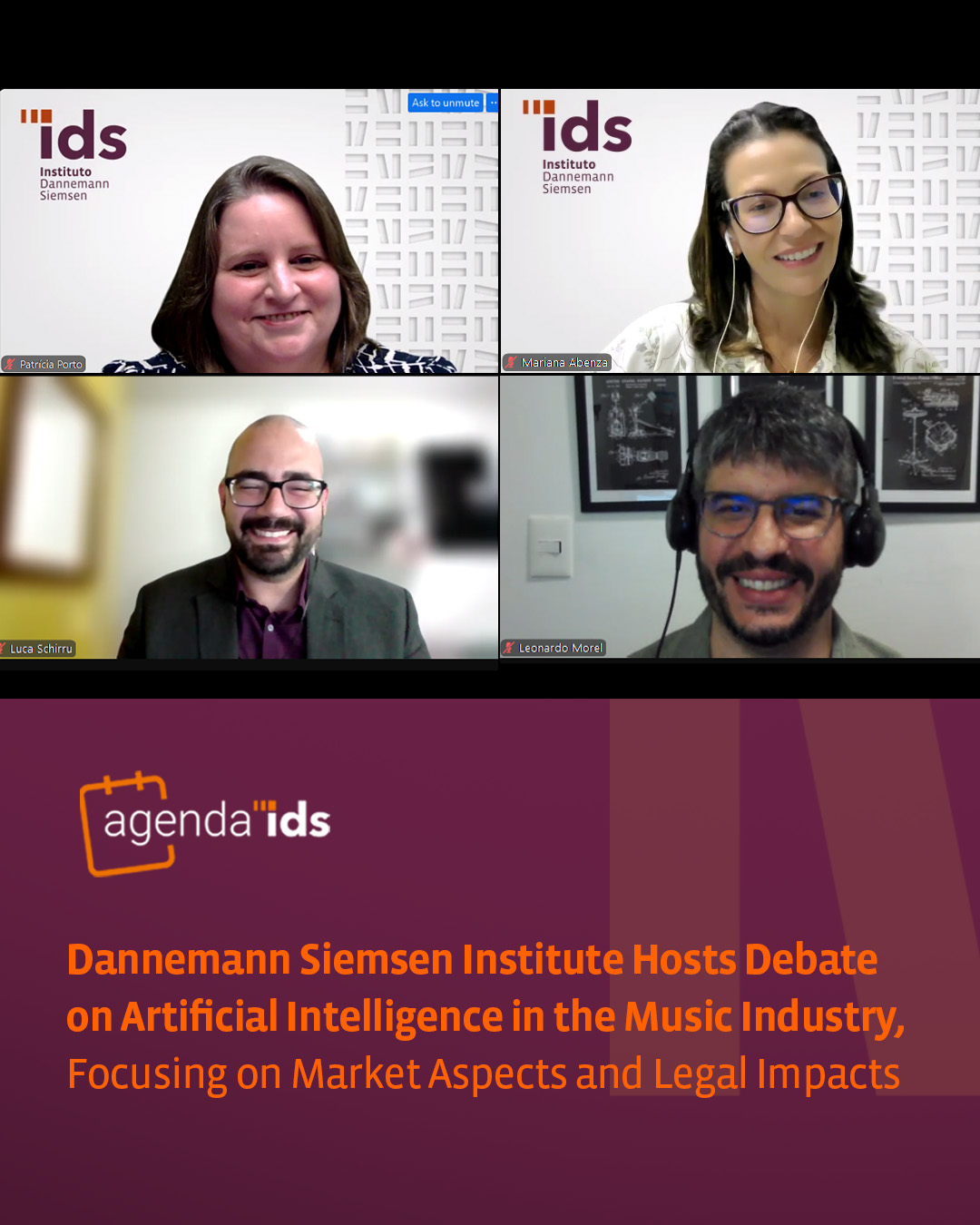06 de maio de 2025
Share
Dannemann Siemsen Institute Hosts Debate on Artificial Intelligence in the Music Industry, Focusing on Market Aspects and Legal Impacts
On April 28, the Dannemann Siemsen Institute (IDS) held an in-depth debate on the impacts of artificial intelligence (AI) in the music industry, bringing together experts to analyze legal and practical challenges, as well as ongoing transformations in the sector.
The event was opened by IDS Academic Coordinator Patricia Porto and moderated by Dannemann Siemsen partner Mariana Abenza. Guest speakers included Luca Schirru, Director of the Brazilian Institute of Copyright (IBDA), and musician and Artists & Repertoire (A&R) manager, Léo Morel.
Mariana began the discussion by emphasizing that while the use of AI systems in the music industry represents a positive revolution for its development, it can also cause significant harm if left unregulated—particularly by infringing copyright and affecting the rights of authors and other rights holders.
Passing the floor to Leonardo Morel, the musician outlined practical challenges faced in the music industry due to AI. Morel explained that his role involves bridging companies and artists from planning through post-release, and that the most noticeable impact of AI is in music creation—particularly in soundtracks, where companies have started using AI to compose rather than hiring musicians. He also highlighted AI-generated music imitating artists’ voices and styles. Morel cited the case of Galinha Pintadinha, where fake, pirated songs generated by AI were uploaded to official profiles via foreign distributors, revealing weak platform controls and the difficulty of removing such fraudulent content.
Next, Mariana invited Luca Schirru to discuss legal challenges. Schirru explained that AI systems like Suno and Udio require training with copyrighted works, which raises a fundamental question: is it lawful to use these works for training, especially for commercial purposes? He stressed the need for transparency regarding the datasets used, enabling authors to exercise their right to opt out. Another issue is whether AI-generated works can be protected under copyright law and whether user prompts are sufficient to establish human authorship. Schirru also questioned how to balance copyright protection with the competitive development of AI technologies.
Mariana asked Schirru about the bill proposing an AI regulatory framework in Brazil and its implications for AI use and copyright protection. Schirru explained that Bill No. 2,338/2023 does not directly address copyright protection for AI-generated works, but it regulates the use of third-party copyrighted works in AI training and establishes transparency obligations. He warned of the risk that large rights holders may negotiate directly with tech companies, leaving individual authors unprotected. He also mentioned ongoing international lawsuits regarding the unauthorized use of sound recordings for AI training, which are still pending decisions.
Following this, Mariana asked Morel about market responses to these challenges. Morel pointed to initiatives like Deezer’s use of technology to identify AI-generated tracks and limit fraudulent uploads, but emphasized that the burden of monitoring still falls heavily on authors and rights holders. He advocated for platforms to take greater responsibility by implementing preventive mechanisms—such as automatically blocking uploads of tracks from unauthorized users, allowing only verified and authorized rights holders (like record labels) to upload specific music—to prevent fraud.
Mariana returned to Schirru to explore legal alternatives in cases of unauthorized use of works. Schirru noted that although there are no precedents in Brazil, rights holders can resort to the Copyright Law to seek judicial remedies, particularly in commercial cases. As a precaution for AI tool users, he recommended reviewing platform terms of use and adopting preventive measures, such as choosing tools trained only with licensed or public domain content.
Mariana then asked Morel to comment on the benefits of AI. Morel highlighted that AI software simplifies processes like mixing and mastering—making them accessible to emerging artists—and assists with finishing lyrics and arrangements, thereby democratizing music production. He acknowledged that AI could create opportunities for new types of creators, including those without formal musical training.
Finally, in response to audience questions about evidence of the use of copyrighted works in AI training for legal claims, Schirru explained that international cases have included practical tests to demonstrate similarities between AI-generated content and protected works, though the matter remains legally unsettled.
Recordings of the event will soon be available on the IDS website.
Note: For quick release, this English version is provided by automated translation without human review.
